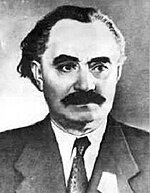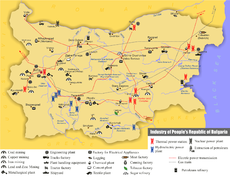People's Republic of Bulgaria
After a new energy and transportation infrastructure was constructed, by 1960 manufacturing became the dominant sector of the economy and Bulgaria became a major exporter of household goods and later of computer technologies, earning it the nickname of "Silicon Valley of the Eastern Bloc".In 1989, after a few years of liberal influence, political reforms were initiated and Todor Zhivkov, who had served as head of the party since 1954, was removed from office in a BCP congress.After taking power, the Fatherland Front formed a coalition led by former Prime Minister Kimon Georgiev, which included the Social Democrats and the Agrarians.Under the terms of the peace settlement, Bulgaria was allowed to keep Southern Dobruja, but formally renounced all claims to Greek and Yugoslav territory.The Communists deliberately took a minor role in the new government at first, though an all-Communist regency council was set up for the young Tsar Simeon II.On 1 February 1945, Regent Prince Kiril, former Prime Minister Bogdan Filov, and hundreds of other officials of the kingdom were arrested on charges of war crimes.As the war came to a halt, the government expanded its campaign of political revolution to attack economic elites in banking and private business.It is estimated that, between 1944 and 1989, between 5,000 and 10,000 people were killed in Bulgaria as part of agricultural collectivisation and political repression, although documentation is insufficient for a definitive judgement.In 1954, Chervenkov accepted the collective leadership, remained prime minister, but ceded his position as party leader to Todor Zhivkov.For this purpose, he launched a policy of forced Macedonisation of the Bulgarian population in the Pirin region through conscious change of ethnic self-determination, held by means of administrative coercion and intensive propaganda.State authorities instructed the local population in the Pirin region to mark administrative records such as "Macedonian", including Pomaks, with the exception of those originating within the country.At its meeting on 21 December, the Regional Committee of the Workers' Party in Upper Cuma decided to accept a formula indicating 70% of residents were "Macedonians".The operation was codenamed "Cross" and the plan was that Bulgarian secret agents would set fire in the Ecumenical Patriarchate of Constantinople and make it look like the work of Turks.In addition, the Bulgarians also planned to boost the effect of its operation against Greece and Turkey by conducting "active measures" "for putting the enemy in a position of delusion".[12] In 1971, the new "Zhivkovskata" Constitution added so-called "Article 1", which grants the PA as the sole ruling a "leading force of society and the state".In 1978, Bulgaria attracted international attention when dissident writer Georgi Markov was accosted on a London street by a stranger who rammed his leg with the tip of an umbrella.The Bulgarian People's Army sided with the Soviet Union and the Afghan communists during the Soviet–Afghan War in Afghanistan fighting the jihadist guerrillas from 1982 until its withdrawal in 1989.Some social and cultural liberalization and progress was led by Lyudmila Zhivkova, Todor's daughter, who became a source of strong disapproval and annoyance to the Communist Party due to her unorthodox lifestyle that included the practicing of Eastern religions.The 1989 expulsion of Turks from Bulgaria caused a significant drop in agricultural production in the southern regions due to the loss of around 300,000 workers.More moderate elements in the Communist leadership reacted by deposing Zhivkov and replacing him with foreign minister Petar Mladenov on 10 November 1989.On 15 January 1990, the National Assembly formally amended the legal code to abolish the Communist Party's "leading role".The country received large amounts of Soviet weaponry, and eventually established a domestic military vehicle production capability.His rule lasted from 1950 to 1955, and saw the construction of dozens of dams and hydroelectric powerplants, chemical works, the Elatsite gold and copper mine and many others.[29] Despite relative stability, the economy shared the same drawbacks of other countries from Eastern Europe – it traded almost entirely with the Soviet Union (more than 60%) and planners could not take into account whether there were markets for the goods produced.Culture in PRB was strictly regulated by the government, although there were some periods of liberalization (meaning entrance in Bulgaria of Western literature, music, etc.).[citation needed] Chervenkov's resignation and the literary and cultural flowering in the Soviet Union created expectations that the process would continue, but the Hungarian revolution of fall 1956 ended the experiment.






Flag(1971–1990)Coat of arms(1971–1990)Maritsa RushesOur Republic, Hail!Dear Bulgaria, Land of HeroesDear MotherlandWarsaw PactComeconBulgarianOfficial scriptCyrillicSecular stateState atheismBulgarian OrthodoxyDemonym(s)GovernmentUnitaryMarxist–Leninistone-partysocialist republicStalinistdictatorshipmulti-partyparliamentary republicGeneral SecretaryGeorgi DimitrovVulko ChervenkovTodor ZhivkovPetar MladenovAleksandar LilovHead of stateVasil KolarovZhelyu ZhelevHead of governmentAndrey LukanovCold WarZhivkov Constitution1991 ConstitutionPopulationBulgarian levDrives onCalling codeISO 3166 codeTsardom of BulgariaRepublic of BulgariaHistory of BulgariaOdrysian kingdomOld Great BulgariaFirst Bulgarian EmpireChristianizationGolden AgeCometopuli dynastyByzantine BulgariaSecond Bulgarian EmpireSecond Golden AgeMongol invasionDarman and KudelinRecovery and expansionFragmentation and fallDobrujaLovechOttoman BulgariaNational RevivalEstablishment of the Bulgarian ExarchateApril UprisingLiberation WarThird Bulgarian StateSerbo-Bulgarian WarIlinden–Preobrazhenie UprisingBalkan WarsWorld War IWorld War IITransition eraList of monarchsMilitary historyStruggle for MacedoniaBulgariaBulgarian Communist PartyBulgarian Agrarian People's Unionsatellite statesSoviet UnionSoviet RepublicBulgarian resistance movement during World War IIBulgarian coup d'état of 1944Axis powersagrarianpeasant societyindustrializedsocialist societyStalinliberalizationSilicon ValleyEastern Blocsocialist countriesBulgarian Socialist Partysocial democracydemocratic socialismMarxism–Leninism1990 electionBlack SeaRomaniaYugoslaviaSRs SerbiaMacedoniaConstitution of BulgariaBulgaria in World War IIKingdom of BulgariaTripartite Pactthe AxisGerman invasion of Yugoslavia and GreeceFatherland FrontSocialistsAgrarianspartisans1944 Bulgarian coup d'étatRed Armycoup d'étatBulgarian monarchyKimon GeorgievSouthern DobrujaWestern ThraceTsar Simeon IIharassedintimidatedRegentPrince Kiril